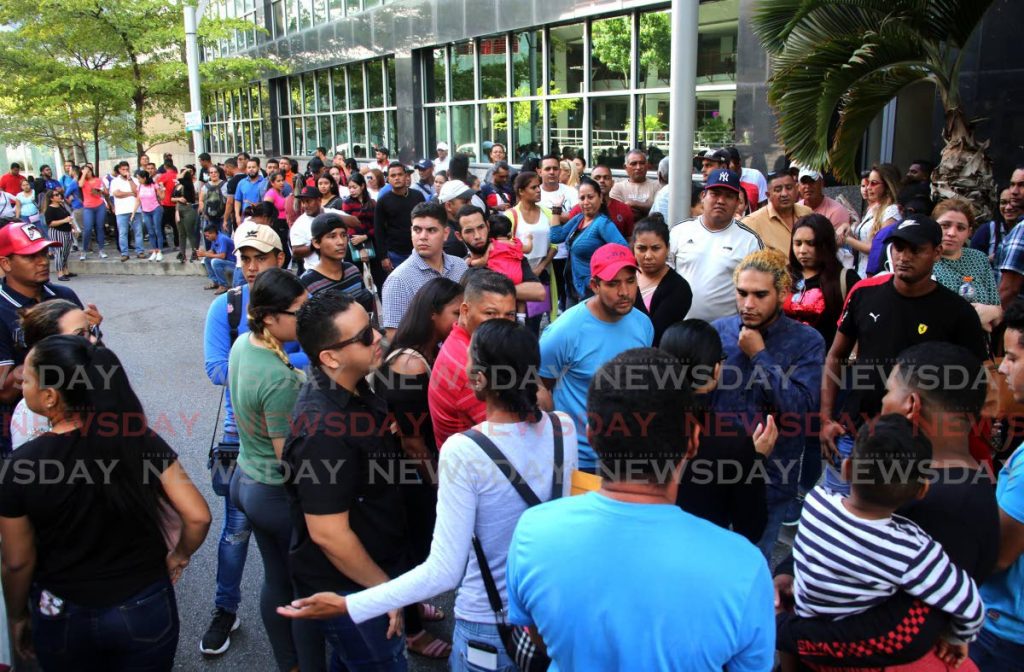Venezuelans still in limbo

Carlos Martínez is an industrial engineer, his brother Jesus is a lawyer, and his cousin Luis is a teacher. All three are Venezuelans who arrived in TT in March, after leaving Venezuela because of its socio-economic problems. Here, they work in construction.
The three took up Government's offer to register to be allowed to live and work for up to one year, but they have not yet received their registration cards. As a result, they have not been able to find better employment opportunities.
Last week marked six months since the registration ended. There are still thousands who are waiting for their cards. They line up every day outside the Immigration Division on Richmond Street in Port of Spain, waiting to know their status.
There is little information about the cards, renewals, the health system and their children's interrupted education.
Luis told the Newsday, “I went to immigration in November and they told me that my card was not ready yet, that I should keep waiting. My cousins don't have it either.”
The three live in Chaguanas and work on a construction project in Freeport.
“We travel every day. We work hard loading blocks, mixing cement. Much of the salary we get is spent on taxis. We have to endure because that is what we can achieve,” added Luis.
In Venezuela he was a science teacher.
"I wish I could work in my profession, teach children about science. But without the card my dream is impossible."
Luis believes as the days go by he will have fewer opportunities to find a better job.
"The cards expire after six months. We do not know on what date they were issued and they still have not been delivered. This process complicates things for Venezuelans."
His cousin Carlos is more optimistic.
“The registration was six months ago, and in that period our conditions on the street improved. There are not so many problems with the police. With the cards, we could look for other options. But the delay complicates everything, even our health.”
Carlos is an industrial engineer with ten years' experience with Venezuelan companies. He feels he could contribute a lot to the development of TT.
"I read in Newsday a report on the possibilities of a census for Venezuelan professionals. That news made me happy. But the businessmen have not said anything else. Now we are worried because time is passing."
There are hundreds of professionals like them who came from Venezuela and will take any work to survive.
Ana Caraballo, who lives in Arima, said, “I have a degree in administration and I speak English. I don't have a job. In the businesses and companies where I have looked, they demand the card.
"It is difficult for me because I cannot do heavy work due to problems with my back.”
She arrived in May, a few days before registration started.
“They gave me the card last week after waiting three hours in line in front of immigration.
"Now I wait for opportunities to work. My family in Venezuela depends on the money I can send them.”
Caraballo believes the TT government can still do more for Venezuelans.
“We already have a work permit for six months that can be one year. But there are still many local people who close their doors. So it is necessary for the TT government to push for full help.
"It was not just giving cards, it is also care in the health system, the education of our children. If you want to help us, make it complete,” she urged.
Some Venezuelans have been able to get better jobs thanks to their professions.
José Manríquez said, “Before registration, I worked painting cars. I was one of the first people who received the card in August, and I was able to get a job similar to what I had in Venezuela, in an oil company."
He believes having the registration card and insisting was important.
"Opportunities exist. Now that we can work legally, we must seek and trust in God," he said, but he also pointed out to locals: “Venezuelans came to TT because of problems in our country. The vast majority came to work for our families. We did not come to stay for a lifetime – this is temporary.
"So I ask the locals to continue opening the doors and give Venezuelans the opportunities.”
SEE PAGE 17


Comments
"Venezuelans still in limbo"